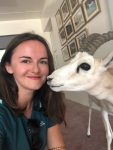
Kristyna Hargitaiova, DVM
 Doctor of Veterinary Medicine
Doctor of Veterinary Medicine
Research Fellow
Incoming PhD Candidate
What is your current career stage? With what institutions and departments are you affiliated, and what position(s) do you hold?
I am a Doctor of Veterinary Medicine (DVM), graduated in 2018 from the Veterinary University Brno in the Czech Republic. I am currently completing a research fellowship in the Delco Laboratory at Cornell University’s College of Veterinary Medicine and will begin my PhD in the Biomedical and Biological Sciences (BBS) Program at Cornell this fall. I am also affiliated with Cornell’s Department of Clinical Sciences and collaborate with both the Meinig School of Biomedical Engineering and external institutions such as the Hospital for Special Surgery (HSS) and City University of Hong Kong.
Can you give us a brief overview of your research?
My research focuses on mitochondrial dysfunction as a driver of poor healing in orthopedic tissues. I currently lead two main projects: (1) investigating the role of Connexin 43 (Cx43) in post-traumatic osteoarthritis using a transgenic mouse model, and (2) testing a first dual-function mitoprotective and anabolic peptide, SPN-15, in a diabetic wound healing model. Although Cx43 is traditionally known as a gap junction protein, emerging evidence suggests it also plays a key role in regulating mitochondrial homeostasis and cellular energy dynamics – making it a critical target in understanding how impaired intercellular communication contributes to mitochondrial dysfunction.
What areas are you most passionate about and why?
I’m most passionate about translational regenerative medicine, particularly therapies that restore energy production in cells affected by chronic injury or aging. Mitochondria are central to this process, and targeting mitochondrial dysfunction holds transformative potential for treating conditions like osteoarthritis, tendinopathy, desmopathy—and, especially close to my heart as a veterinarian, equine laminitis: a painful and often devastating metabolic-orthopedic disease.
How did you get involved in orthopaedic research?
My journey began outside of academia, in equine clinical practice, managing elite equine athletes with complex orthopedic injuries across Europe and the Middle East. Over time, I grew increasingly frustrated by the lack of truly disease-modifying therapies that could meaningfully improve outcomes for my patients. Driven by a desire to specialize further in equine surgery and orthopedics and contribute to meaningful advances in the field, I pursued a two-year research fellowship at Cornell University, where I now focus on upstream, mechanistic approaches to joint degeneration.
Have you had any mentors who have shaped your journey so far?
Absolutely. Dr. Michelle Delco has been instrumental in shaping my research perspective. I also work closely with Dr. Hazel Szeto, whose groundbreaking work on mitochondrial-targeted therapeutics continues to inspire and influence my scientific goals. My first exposure to high-level clinical research came during veterinary school, where I had the opportunity to learn from renowned equine laminitis researchers Drs. Jim Belknap and Chris Pollitt – an experience that made me pursue a career as a clinician-scientist. After graduation, I was fortunate to work under the mentorship of Dr. Grigorios Maleas during my internship in Germany. His unwavering dedication to evidence-based medicine and relentless drive for innovation have remained a guiding influence in my professional journey.
What are some of the biggest challenges in your research journey so far?
The biggest challenge was transitioning from 100% clinical, equine private practice work, to full-time research. It required a steep learning curve in lab management, experimental design, lab techniques, and scientific communication.
What is one accomplishment you are really proud of?
I guess leading three major translational projects during my fellowship: presenting a new large-animal PTOA model at ORS 2025, where it received the 3Rs Award; advancing our Connexin 43 knockout study toward completion; and leading a diabetic wound healing project that earned a Rising Star Award at the 2025 Mitochondrial Transplantation and Next Generation Therapeutics Conference.
What are your career goals?
My goal is to become an academic clinician-scientist leading a translational research program focused on regenerative therapies for poorly healing orthopedic conditions in both human and veterinary medicine. I also look forward to teaching – raising the next generation of veterinarians and helping them develop new skills is one of the most rewarding aspects of academic veterinary medicine.
What are you most excited about in the future of orthopaedic research?
The integration of bioenergetics and precision medicine into orthopedic research. We are only beginning to understand the impact of mitochondrial health on tissue repair and degeneration. This has the potential to reshape how we prevent and treat chronic orthopedic disease.
What is one thing you wish you knew when you were first starting out?
Nothing can compensate for lost time.
Any personal interests or hobbies you would like to share?
I’m looking forward to getting back in the saddle – horses have always been a huge part of my life. I’m also a passionate piano and violin player, and my guilty pleasure is playing World of Warcraft.
What advice would you give to other students or early-career professionals who are starting out in the field?
Never turn down an opportunity to learn or grow – what may seem minor at the time could lead to something meaningful later. If the right opportunity doesn’t exist, create it. Don’t waste time, and don’t wait for things to happen to you. At the same time, never try to advance by stepping on others. Be fair, and remember that real professional relationships are mutual – don’t use people solely for your benefit, bring something of value in return.
Treat everyone with respect, especially those in supporting roles – technicians, nurses, facility staff. These are the people who keep science and medicine moving forward, and how you treat them reflects who you are. Lastly, don’t neglect your personal relationships – your job won’t bring you tea and medicine when you’re sick.
The post Kristyna Hargitaiova, DVM appeared first on ORS.
 Doctor of Veterinary Medicine
Doctor of Veterinary Medicine


